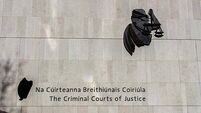University of Galway will not approve projects linked to Israeli institutions

By Gráinne Ní Aodha, PA
The University of Galway has said it will not seek approval for or approve research partnerships that include Israeli institutions.
But it said that it cannot exit from one research project involving an Israeli institution because of recent legal advice.
The university had implemented a process for assessing collaborations – the Human Rights Impact Assessment (HRIA) – after a review of the university’s links with Israeli and Palestinian institutions published in June 2024.
In a letter sent to all staff and students on Friday, the university outlined its approval process for becoming involved in the Asterisk research project, funded under Horizon Europe.
The University of Galway is the coordinating partner on the project and Technion, an Israeli institute of technology, is also a partner.
The grant agreement for the Asterisk project was signed before the interim HRIA process was applied to it.
The University Management Team (UMT) decided that the interim HRIA process would be applied retrospectively to the project.
However, recent legal advice said the interim HRIA process should not be relied upon because of the absence of a formalised, approved university policy and procedure on such matters.
The university said that without such a policy, withdrawing from the project would not be in line with its governance processes.
At a meeting on Monday, the UMT agreed the University “is obliged” to continue its involvement in the Asterisk project, based on its contractual obligations.
It also agreed that the University “would not submit for approval or agree to participate in any new institutional research agreements involving direct Israeli partners, until further notice”.
In a letter sent to staff and students by Professor Peter McHugh, interim president and chairman of the UMT, he said they would also enable access to higher education study and research for Palestinians in Gaza.
“Throughout the past six months we have taken a number of steps to facilitate access to undergraduate and postgraduate study. This is currently being offered to 14 students, involving scholarships and fee waivers, visa, evacuation and arrival support.
“We have actively engaged in an extensive coordinated process to enable the evacuation, safe passage and supports for these students and we will outline more about this work at a later date.
“We once again reiterate that ‘we stand for peace’: we condemn all acts of terror and violence and we join in the calls for an immediate, permanent ceasefire; for access to food aid, clean water and medical supplies without delay; for the release of hostages; and for justice, accountability, and equal protection of human rights.”
In June, Trinity College Dublin said it would divest from new arrangements with Israeli universities, firms and institutions.





